LAWS20060: Taxation Law of Australia Individual Assignment Term 1 2019
VerifiedAdded on 2023/01/05
|13
|3718
|38
Homework Assignment
AI Summary
This document presents a comprehensive solution to a taxation law assignment, addressing several key areas of Australian taxation. The assignment explores concepts such as the calculation of effective life of depreciating assets as per Taxation Ruling TR 2018/4, tax offsets under the Income Tax Assessment Act 1997, and the highest tax rates for the 2018/19 income year. It also delves into capital gains tax (CGT) events, including CGT event B1, and exemptions under section 118.13 of the Act. The solution further analyzes income tax calculations, deductions for expenses incurred in earning taxable income, and the distinction between average and marginal tax rates. Additionally, it covers consumption tax and provides detailed answers to hypothetical scenarios involving loan interest deductions, apportionment of expenses for business and personal use, deductibility of babysitting costs, losses from stolen goods, and expenses related to political campaigns. The assignment also examines CGT events related to land leases and the sale of farmland, as well as the application of CGT to a house used for both residential and rental purposes. Finally, it includes a capital gains tax computation for share transactions, illustrating the application of CGT principles.
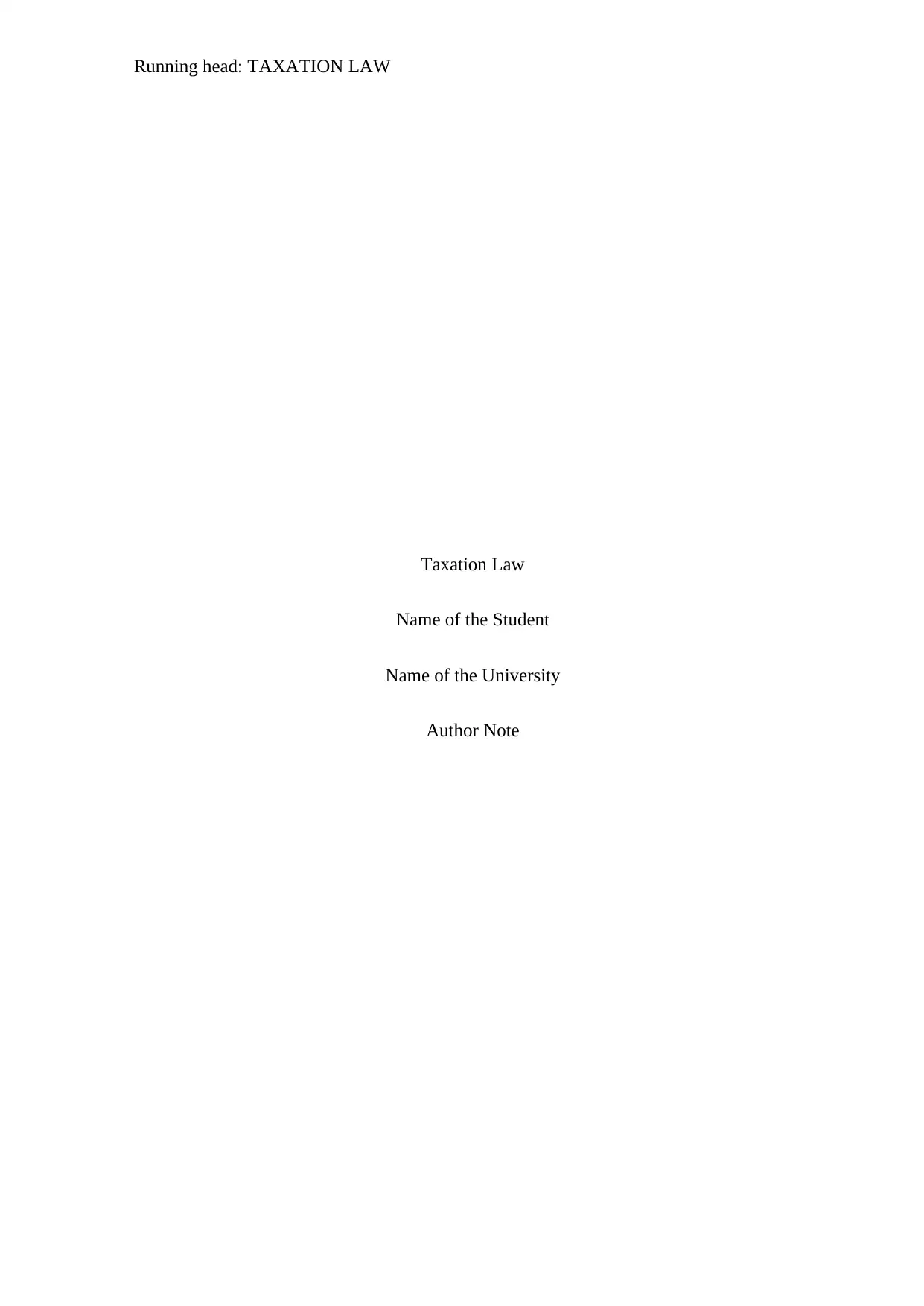
Running head: TAXATION LAW
Taxation Law
Name of the Student
Name of the University
Author Note
Taxation Law
Name of the Student
Name of the University
Author Note
Paraphrase This Document
Need a fresh take? Get an instant paraphrase of this document with our AI Paraphraser
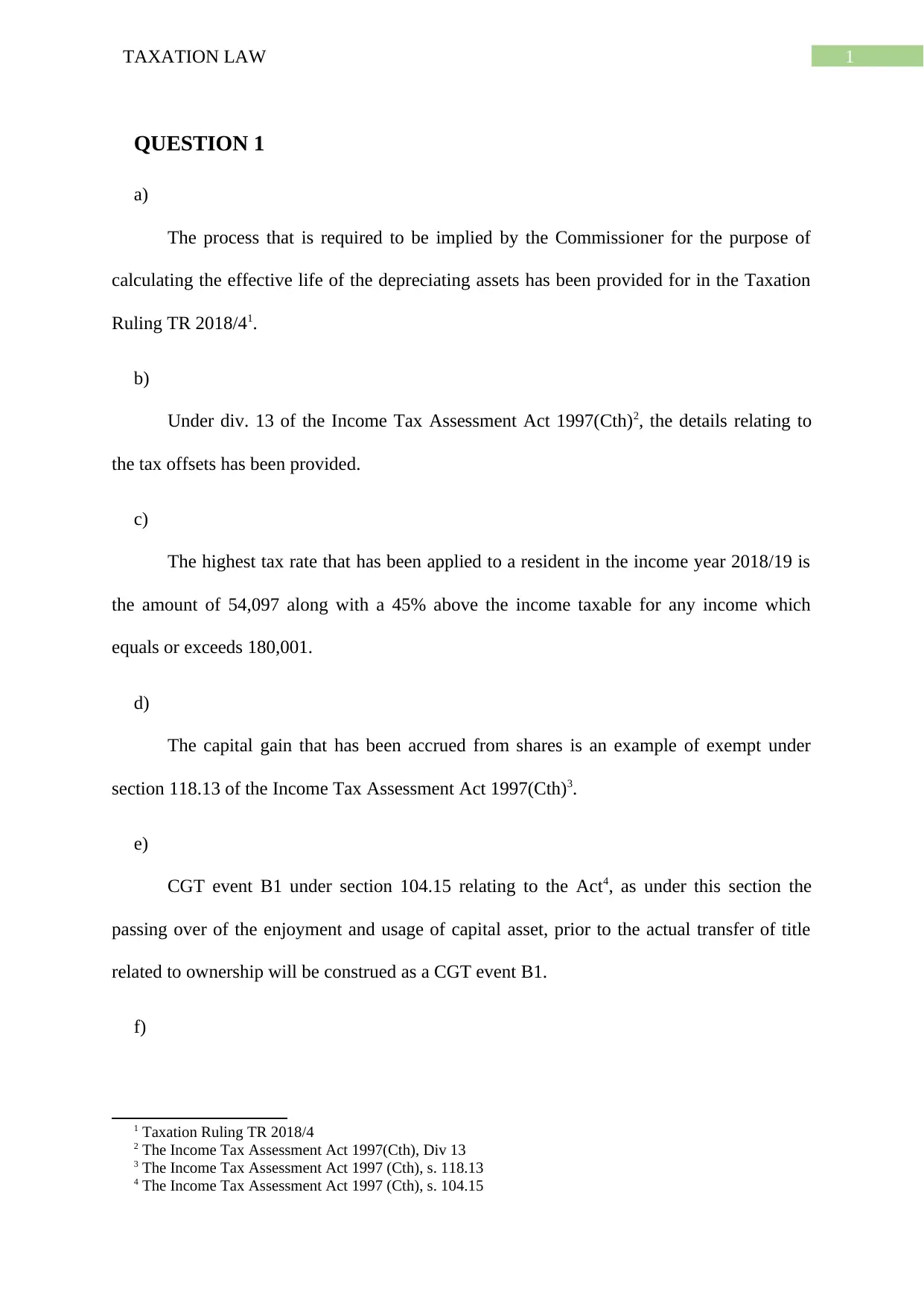
1TAXATION LAW
QUESTION 1
a)
The process that is required to be implied by the Commissioner for the purpose of
calculating the effective life of the depreciating assets has been provided for in the Taxation
Ruling TR 2018/41.
b)
Under div. 13 of the Income Tax Assessment Act 1997(Cth)2, the details relating to
the tax offsets has been provided.
c)
The highest tax rate that has been applied to a resident in the income year 2018/19 is
the amount of 54,097 along with a 45% above the income taxable for any income which
equals or exceeds 180,001.
d)
The capital gain that has been accrued from shares is an example of exempt under
section 118.13 of the Income Tax Assessment Act 1997(Cth)3.
e)
CGT event B1 under section 104.15 relating to the Act4, as under this section the
passing over of the enjoyment and usage of capital asset, prior to the actual transfer of title
related to ownership will be construed as a CGT event B1.
f)
1 Taxation Ruling TR 2018/4
2 The Income Tax Assessment Act 1997(Cth), Div 13
3 The Income Tax Assessment Act 1997 (Cth), s. 118.13
4 The Income Tax Assessment Act 1997 (Cth), s. 104.15
QUESTION 1
a)
The process that is required to be implied by the Commissioner for the purpose of
calculating the effective life of the depreciating assets has been provided for in the Taxation
Ruling TR 2018/41.
b)
Under div. 13 of the Income Tax Assessment Act 1997(Cth)2, the details relating to
the tax offsets has been provided.
c)
The highest tax rate that has been applied to a resident in the income year 2018/19 is
the amount of 54,097 along with a 45% above the income taxable for any income which
equals or exceeds 180,001.
d)
The capital gain that has been accrued from shares is an example of exempt under
section 118.13 of the Income Tax Assessment Act 1997(Cth)3.
e)
CGT event B1 under section 104.15 relating to the Act4, as under this section the
passing over of the enjoyment and usage of capital asset, prior to the actual transfer of title
related to ownership will be construed as a CGT event B1.
f)
1 Taxation Ruling TR 2018/4
2 The Income Tax Assessment Act 1997(Cth), Div 13
3 The Income Tax Assessment Act 1997 (Cth), s. 118.13
4 The Income Tax Assessment Act 1997 (Cth), s. 104.15
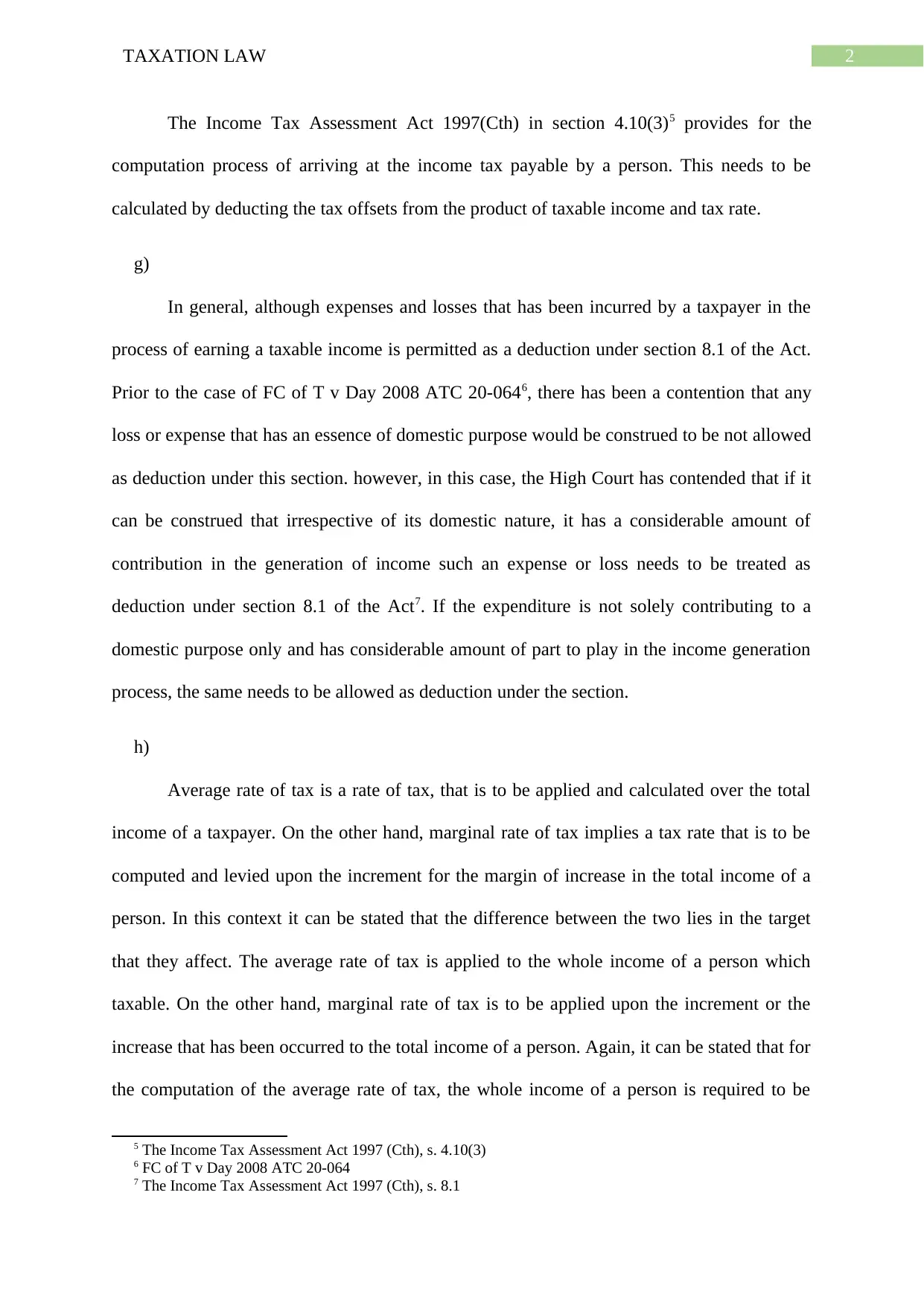
2TAXATION LAW
The Income Tax Assessment Act 1997(Cth) in section 4.10(3)5 provides for the
computation process of arriving at the income tax payable by a person. This needs to be
calculated by deducting the tax offsets from the product of taxable income and tax rate.
g)
In general, although expenses and losses that has been incurred by a taxpayer in the
process of earning a taxable income is permitted as a deduction under section 8.1 of the Act.
Prior to the case of FC of T v Day 2008 ATC 20-0646, there has been a contention that any
loss or expense that has an essence of domestic purpose would be construed to be not allowed
as deduction under this section. however, in this case, the High Court has contended that if it
can be construed that irrespective of its domestic nature, it has a considerable amount of
contribution in the generation of income such an expense or loss needs to be treated as
deduction under section 8.1 of the Act7. If the expenditure is not solely contributing to a
domestic purpose only and has considerable amount of part to play in the income generation
process, the same needs to be allowed as deduction under the section.
h)
Average rate of tax is a rate of tax, that is to be applied and calculated over the total
income of a taxpayer. On the other hand, marginal rate of tax implies a tax rate that is to be
computed and levied upon the increment for the margin of increase in the total income of a
person. In this context it can be stated that the difference between the two lies in the target
that they affect. The average rate of tax is applied to the whole income of a person which
taxable. On the other hand, marginal rate of tax is to be applied upon the increment or the
increase that has been occurred to the total income of a person. Again, it can be stated that for
the computation of the average rate of tax, the whole income of a person is required to be
5 The Income Tax Assessment Act 1997 (Cth), s. 4.10(3)
6 FC of T v Day 2008 ATC 20-064
7 The Income Tax Assessment Act 1997 (Cth), s. 8.1
The Income Tax Assessment Act 1997(Cth) in section 4.10(3)5 provides for the
computation process of arriving at the income tax payable by a person. This needs to be
calculated by deducting the tax offsets from the product of taxable income and tax rate.
g)
In general, although expenses and losses that has been incurred by a taxpayer in the
process of earning a taxable income is permitted as a deduction under section 8.1 of the Act.
Prior to the case of FC of T v Day 2008 ATC 20-0646, there has been a contention that any
loss or expense that has an essence of domestic purpose would be construed to be not allowed
as deduction under this section. however, in this case, the High Court has contended that if it
can be construed that irrespective of its domestic nature, it has a considerable amount of
contribution in the generation of income such an expense or loss needs to be treated as
deduction under section 8.1 of the Act7. If the expenditure is not solely contributing to a
domestic purpose only and has considerable amount of part to play in the income generation
process, the same needs to be allowed as deduction under the section.
h)
Average rate of tax is a rate of tax, that is to be applied and calculated over the total
income of a taxpayer. On the other hand, marginal rate of tax implies a tax rate that is to be
computed and levied upon the increment for the margin of increase in the total income of a
person. In this context it can be stated that the difference between the two lies in the target
that they affect. The average rate of tax is applied to the whole income of a person which
taxable. On the other hand, marginal rate of tax is to be applied upon the increment or the
increase that has been occurred to the total income of a person. Again, it can be stated that for
the computation of the average rate of tax, the whole income of a person is required to be
5 The Income Tax Assessment Act 1997 (Cth), s. 4.10(3)
6 FC of T v Day 2008 ATC 20-064
7 The Income Tax Assessment Act 1997 (Cth), s. 8.1
⊘ This is a preview!⊘
Do you want full access?
Subscribe today to unlock all pages.

Trusted by 1+ million students worldwide
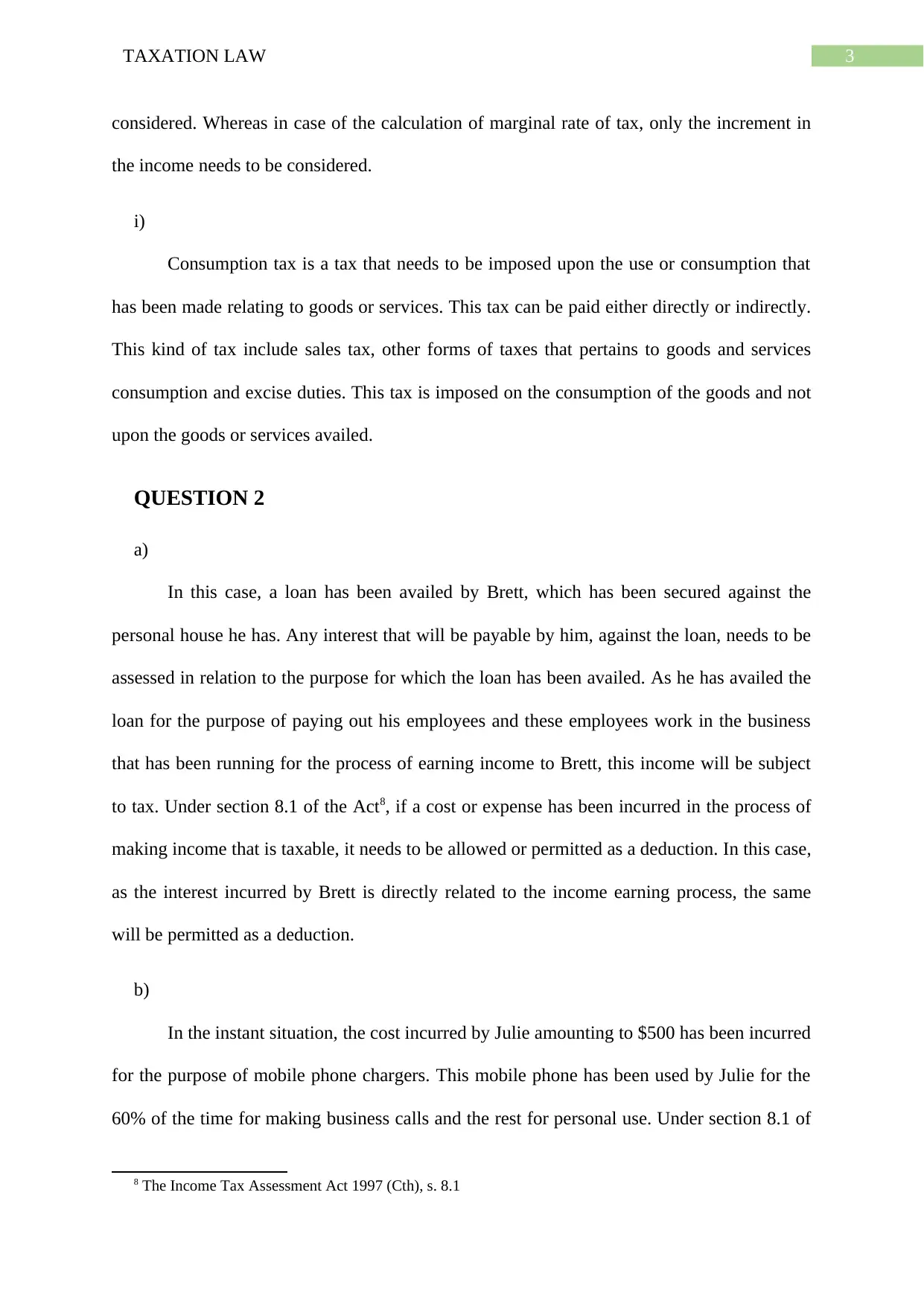
3TAXATION LAW
considered. Whereas in case of the calculation of marginal rate of tax, only the increment in
the income needs to be considered.
i)
Consumption tax is a tax that needs to be imposed upon the use or consumption that
has been made relating to goods or services. This tax can be paid either directly or indirectly.
This kind of tax include sales tax, other forms of taxes that pertains to goods and services
consumption and excise duties. This tax is imposed on the consumption of the goods and not
upon the goods or services availed.
QUESTION 2
a)
In this case, a loan has been availed by Brett, which has been secured against the
personal house he has. Any interest that will be payable by him, against the loan, needs to be
assessed in relation to the purpose for which the loan has been availed. As he has availed the
loan for the purpose of paying out his employees and these employees work in the business
that has been running for the process of earning income to Brett, this income will be subject
to tax. Under section 8.1 of the Act8, if a cost or expense has been incurred in the process of
making income that is taxable, it needs to be allowed or permitted as a deduction. In this case,
as the interest incurred by Brett is directly related to the income earning process, the same
will be permitted as a deduction.
b)
In the instant situation, the cost incurred by Julie amounting to $500 has been incurred
for the purpose of mobile phone chargers. This mobile phone has been used by Julie for the
60% of the time for making business calls and the rest for personal use. Under section 8.1 of
8 The Income Tax Assessment Act 1997 (Cth), s. 8.1
considered. Whereas in case of the calculation of marginal rate of tax, only the increment in
the income needs to be considered.
i)
Consumption tax is a tax that needs to be imposed upon the use or consumption that
has been made relating to goods or services. This tax can be paid either directly or indirectly.
This kind of tax include sales tax, other forms of taxes that pertains to goods and services
consumption and excise duties. This tax is imposed on the consumption of the goods and not
upon the goods or services availed.
QUESTION 2
a)
In this case, a loan has been availed by Brett, which has been secured against the
personal house he has. Any interest that will be payable by him, against the loan, needs to be
assessed in relation to the purpose for which the loan has been availed. As he has availed the
loan for the purpose of paying out his employees and these employees work in the business
that has been running for the process of earning income to Brett, this income will be subject
to tax. Under section 8.1 of the Act8, if a cost or expense has been incurred in the process of
making income that is taxable, it needs to be allowed or permitted as a deduction. In this case,
as the interest incurred by Brett is directly related to the income earning process, the same
will be permitted as a deduction.
b)
In the instant situation, the cost incurred by Julie amounting to $500 has been incurred
for the purpose of mobile phone chargers. This mobile phone has been used by Julie for the
60% of the time for making business calls and the rest for personal use. Under section 8.1 of
8 The Income Tax Assessment Act 1997 (Cth), s. 8.1
Paraphrase This Document
Need a fresh take? Get an instant paraphrase of this document with our AI Paraphraser
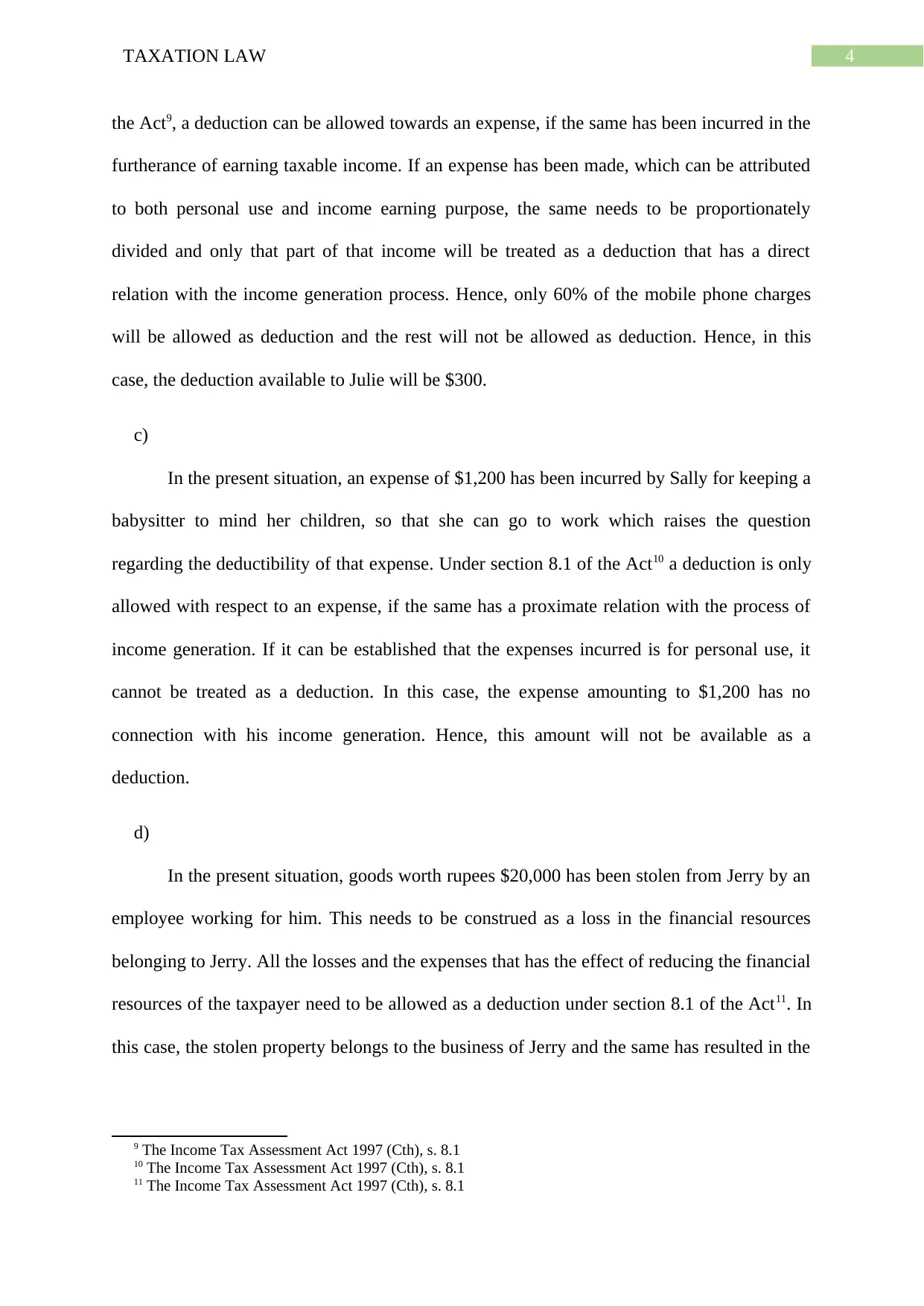
4TAXATION LAW
the Act9, a deduction can be allowed towards an expense, if the same has been incurred in the
furtherance of earning taxable income. If an expense has been made, which can be attributed
to both personal use and income earning purpose, the same needs to be proportionately
divided and only that part of that income will be treated as a deduction that has a direct
relation with the income generation process. Hence, only 60% of the mobile phone charges
will be allowed as deduction and the rest will not be allowed as deduction. Hence, in this
case, the deduction available to Julie will be $300.
c)
In the present situation, an expense of $1,200 has been incurred by Sally for keeping a
babysitter to mind her children, so that she can go to work which raises the question
regarding the deductibility of that expense. Under section 8.1 of the Act10 a deduction is only
allowed with respect to an expense, if the same has a proximate relation with the process of
income generation. If it can be established that the expenses incurred is for personal use, it
cannot be treated as a deduction. In this case, the expense amounting to $1,200 has no
connection with his income generation. Hence, this amount will not be available as a
deduction.
d)
In the present situation, goods worth rupees $20,000 has been stolen from Jerry by an
employee working for him. This needs to be construed as a loss in the financial resources
belonging to Jerry. All the losses and the expenses that has the effect of reducing the financial
resources of the taxpayer need to be allowed as a deduction under section 8.1 of the Act11. In
this case, the stolen property belongs to the business of Jerry and the same has resulted in the
9 The Income Tax Assessment Act 1997 (Cth), s. 8.1
10 The Income Tax Assessment Act 1997 (Cth), s. 8.1
11 The Income Tax Assessment Act 1997 (Cth), s. 8.1
the Act9, a deduction can be allowed towards an expense, if the same has been incurred in the
furtherance of earning taxable income. If an expense has been made, which can be attributed
to both personal use and income earning purpose, the same needs to be proportionately
divided and only that part of that income will be treated as a deduction that has a direct
relation with the income generation process. Hence, only 60% of the mobile phone charges
will be allowed as deduction and the rest will not be allowed as deduction. Hence, in this
case, the deduction available to Julie will be $300.
c)
In the present situation, an expense of $1,200 has been incurred by Sally for keeping a
babysitter to mind her children, so that she can go to work which raises the question
regarding the deductibility of that expense. Under section 8.1 of the Act10 a deduction is only
allowed with respect to an expense, if the same has a proximate relation with the process of
income generation. If it can be established that the expenses incurred is for personal use, it
cannot be treated as a deduction. In this case, the expense amounting to $1,200 has no
connection with his income generation. Hence, this amount will not be available as a
deduction.
d)
In the present situation, goods worth rupees $20,000 has been stolen from Jerry by an
employee working for him. This needs to be construed as a loss in the financial resources
belonging to Jerry. All the losses and the expenses that has the effect of reducing the financial
resources of the taxpayer need to be allowed as a deduction under section 8.1 of the Act11. In
this case, the stolen property belongs to the business of Jerry and the same has resulted in the
9 The Income Tax Assessment Act 1997 (Cth), s. 8.1
10 The Income Tax Assessment Act 1997 (Cth), s. 8.1
11 The Income Tax Assessment Act 1997 (Cth), s. 8.1
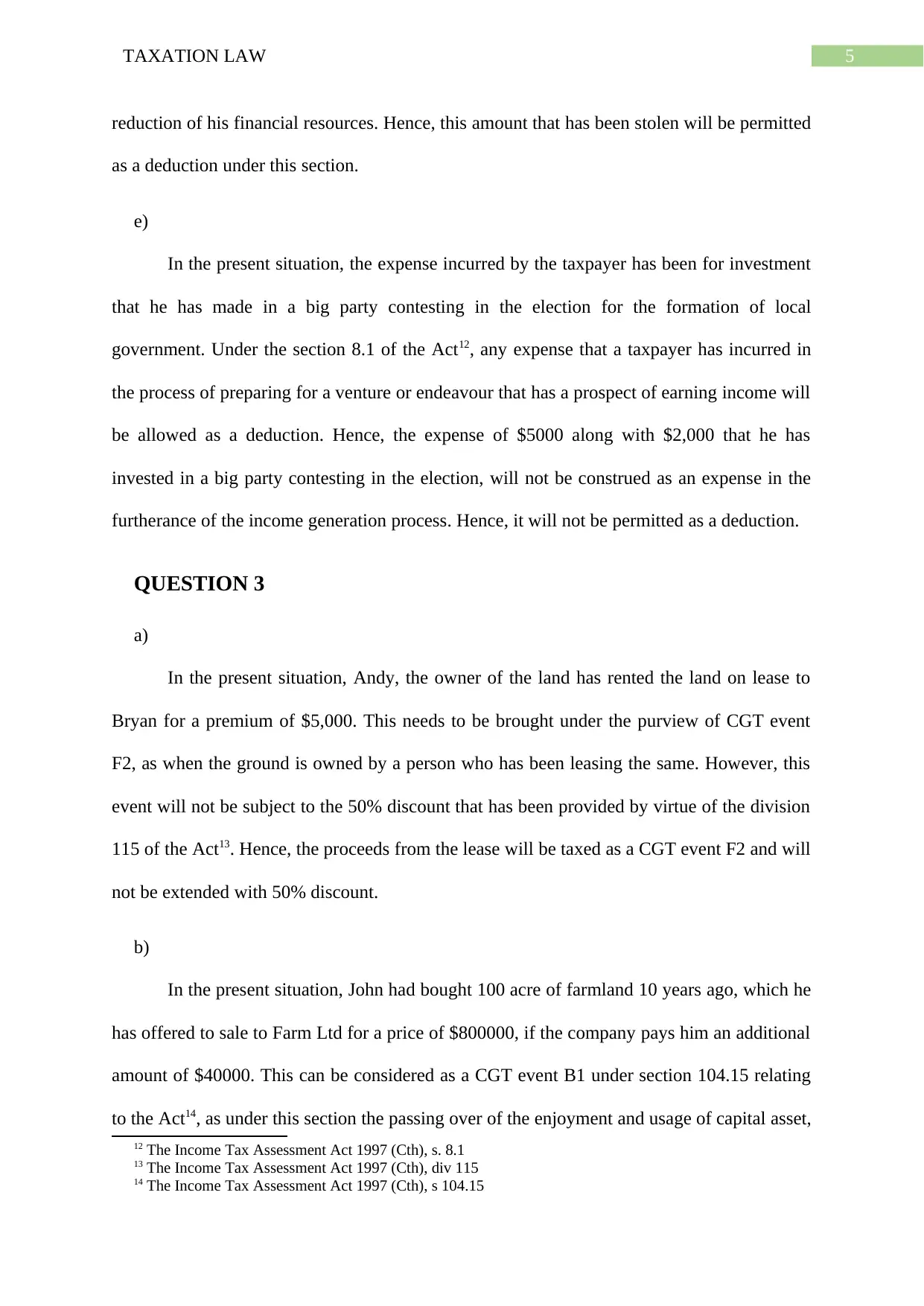
5TAXATION LAW
reduction of his financial resources. Hence, this amount that has been stolen will be permitted
as a deduction under this section.
e)
In the present situation, the expense incurred by the taxpayer has been for investment
that he has made in a big party contesting in the election for the formation of local
government. Under the section 8.1 of the Act12, any expense that a taxpayer has incurred in
the process of preparing for a venture or endeavour that has a prospect of earning income will
be allowed as a deduction. Hence, the expense of $5000 along with $2,000 that he has
invested in a big party contesting in the election, will not be construed as an expense in the
furtherance of the income generation process. Hence, it will not be permitted as a deduction.
QUESTION 3
a)
In the present situation, Andy, the owner of the land has rented the land on lease to
Bryan for a premium of $5,000. This needs to be brought under the purview of CGT event
F2, as when the ground is owned by a person who has been leasing the same. However, this
event will not be subject to the 50% discount that has been provided by virtue of the division
115 of the Act13. Hence, the proceeds from the lease will be taxed as a CGT event F2 and will
not be extended with 50% discount.
b)
In the present situation, John had bought 100 acre of farmland 10 years ago, which he
has offered to sale to Farm Ltd for a price of $800000, if the company pays him an additional
amount of $40000. This can be considered as a CGT event B1 under section 104.15 relating
to the Act14, as under this section the passing over of the enjoyment and usage of capital asset,
12 The Income Tax Assessment Act 1997 (Cth), s. 8.1
13 The Income Tax Assessment Act 1997 (Cth), div 115
14 The Income Tax Assessment Act 1997 (Cth), s 104.15
reduction of his financial resources. Hence, this amount that has been stolen will be permitted
as a deduction under this section.
e)
In the present situation, the expense incurred by the taxpayer has been for investment
that he has made in a big party contesting in the election for the formation of local
government. Under the section 8.1 of the Act12, any expense that a taxpayer has incurred in
the process of preparing for a venture or endeavour that has a prospect of earning income will
be allowed as a deduction. Hence, the expense of $5000 along with $2,000 that he has
invested in a big party contesting in the election, will not be construed as an expense in the
furtherance of the income generation process. Hence, it will not be permitted as a deduction.
QUESTION 3
a)
In the present situation, Andy, the owner of the land has rented the land on lease to
Bryan for a premium of $5,000. This needs to be brought under the purview of CGT event
F2, as when the ground is owned by a person who has been leasing the same. However, this
event will not be subject to the 50% discount that has been provided by virtue of the division
115 of the Act13. Hence, the proceeds from the lease will be taxed as a CGT event F2 and will
not be extended with 50% discount.
b)
In the present situation, John had bought 100 acre of farmland 10 years ago, which he
has offered to sale to Farm Ltd for a price of $800000, if the company pays him an additional
amount of $40000. This can be considered as a CGT event B1 under section 104.15 relating
to the Act14, as under this section the passing over of the enjoyment and usage of capital asset,
12 The Income Tax Assessment Act 1997 (Cth), s. 8.1
13 The Income Tax Assessment Act 1997 (Cth), div 115
14 The Income Tax Assessment Act 1997 (Cth), s 104.15
⊘ This is a preview!⊘
Do you want full access?
Subscribe today to unlock all pages.

Trusted by 1+ million students worldwide
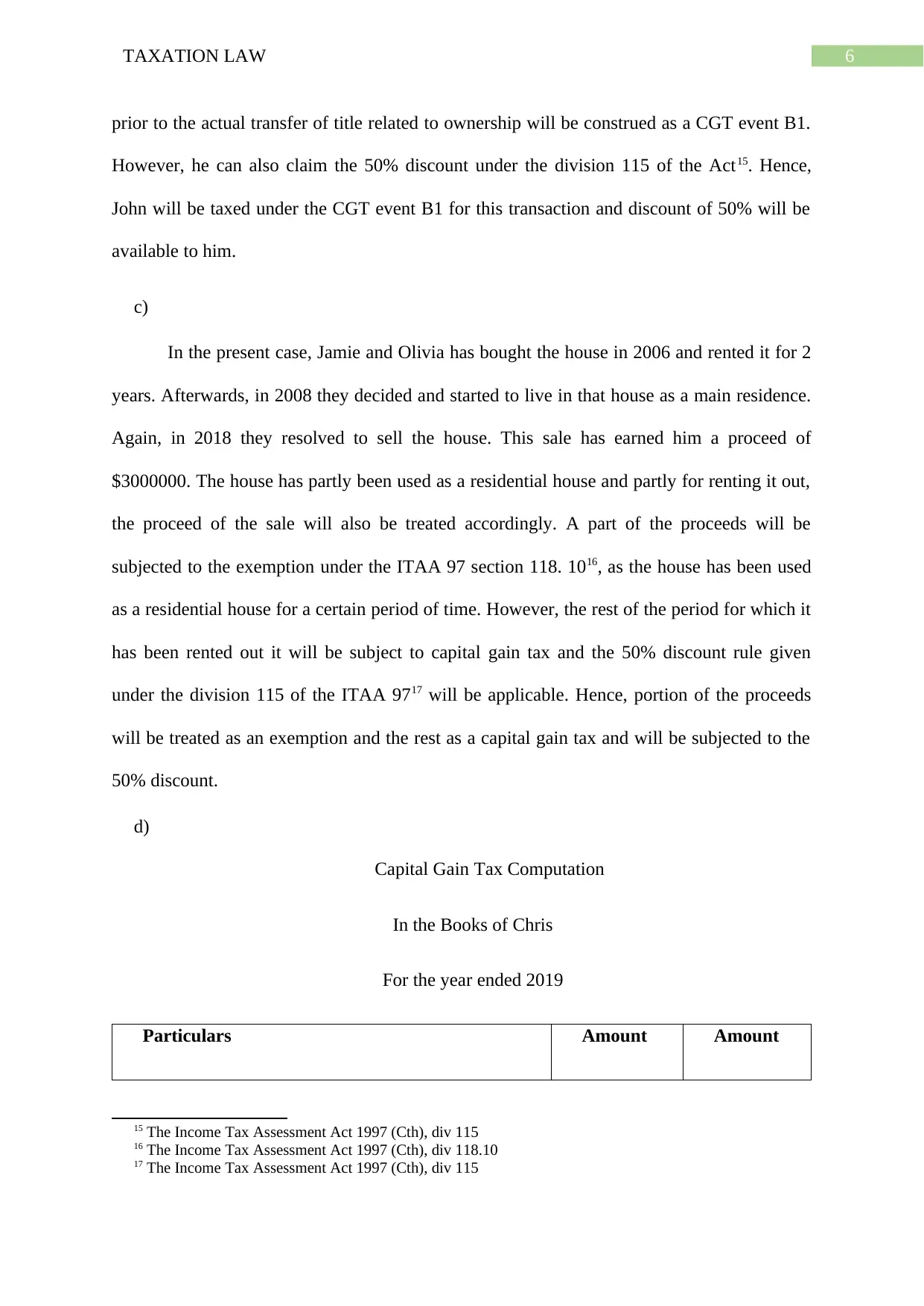
6TAXATION LAW
prior to the actual transfer of title related to ownership will be construed as a CGT event B1.
However, he can also claim the 50% discount under the division 115 of the Act15. Hence,
John will be taxed under the CGT event B1 for this transaction and discount of 50% will be
available to him.
c)
In the present case, Jamie and Olivia has bought the house in 2006 and rented it for 2
years. Afterwards, in 2008 they decided and started to live in that house as a main residence.
Again, in 2018 they resolved to sell the house. This sale has earned him a proceed of
$3000000. The house has partly been used as a residential house and partly for renting it out,
the proceed of the sale will also be treated accordingly. A part of the proceeds will be
subjected to the exemption under the ITAA 97 section 118. 1016, as the house has been used
as a residential house for a certain period of time. However, the rest of the period for which it
has been rented out it will be subject to capital gain tax and the 50% discount rule given
under the division 115 of the ITAA 9717 will be applicable. Hence, portion of the proceeds
will be treated as an exemption and the rest as a capital gain tax and will be subjected to the
50% discount.
d)
Capital Gain Tax Computation
In the Books of Chris
For the year ended 2019
Particulars Amount Amount
15 The Income Tax Assessment Act 1997 (Cth), div 115
16 The Income Tax Assessment Act 1997 (Cth), div 118.10
17 The Income Tax Assessment Act 1997 (Cth), div 115
prior to the actual transfer of title related to ownership will be construed as a CGT event B1.
However, he can also claim the 50% discount under the division 115 of the Act15. Hence,
John will be taxed under the CGT event B1 for this transaction and discount of 50% will be
available to him.
c)
In the present case, Jamie and Olivia has bought the house in 2006 and rented it for 2
years. Afterwards, in 2008 they decided and started to live in that house as a main residence.
Again, in 2018 they resolved to sell the house. This sale has earned him a proceed of
$3000000. The house has partly been used as a residential house and partly for renting it out,
the proceed of the sale will also be treated accordingly. A part of the proceeds will be
subjected to the exemption under the ITAA 97 section 118. 1016, as the house has been used
as a residential house for a certain period of time. However, the rest of the period for which it
has been rented out it will be subject to capital gain tax and the 50% discount rule given
under the division 115 of the ITAA 9717 will be applicable. Hence, portion of the proceeds
will be treated as an exemption and the rest as a capital gain tax and will be subjected to the
50% discount.
d)
Capital Gain Tax Computation
In the Books of Chris
For the year ended 2019
Particulars Amount Amount
15 The Income Tax Assessment Act 1997 (Cth), div 115
16 The Income Tax Assessment Act 1997 (Cth), div 118.10
17 The Income Tax Assessment Act 1997 (Cth), div 115
Paraphrase This Document
Need a fresh take? Get an instant paraphrase of this document with our AI Paraphraser
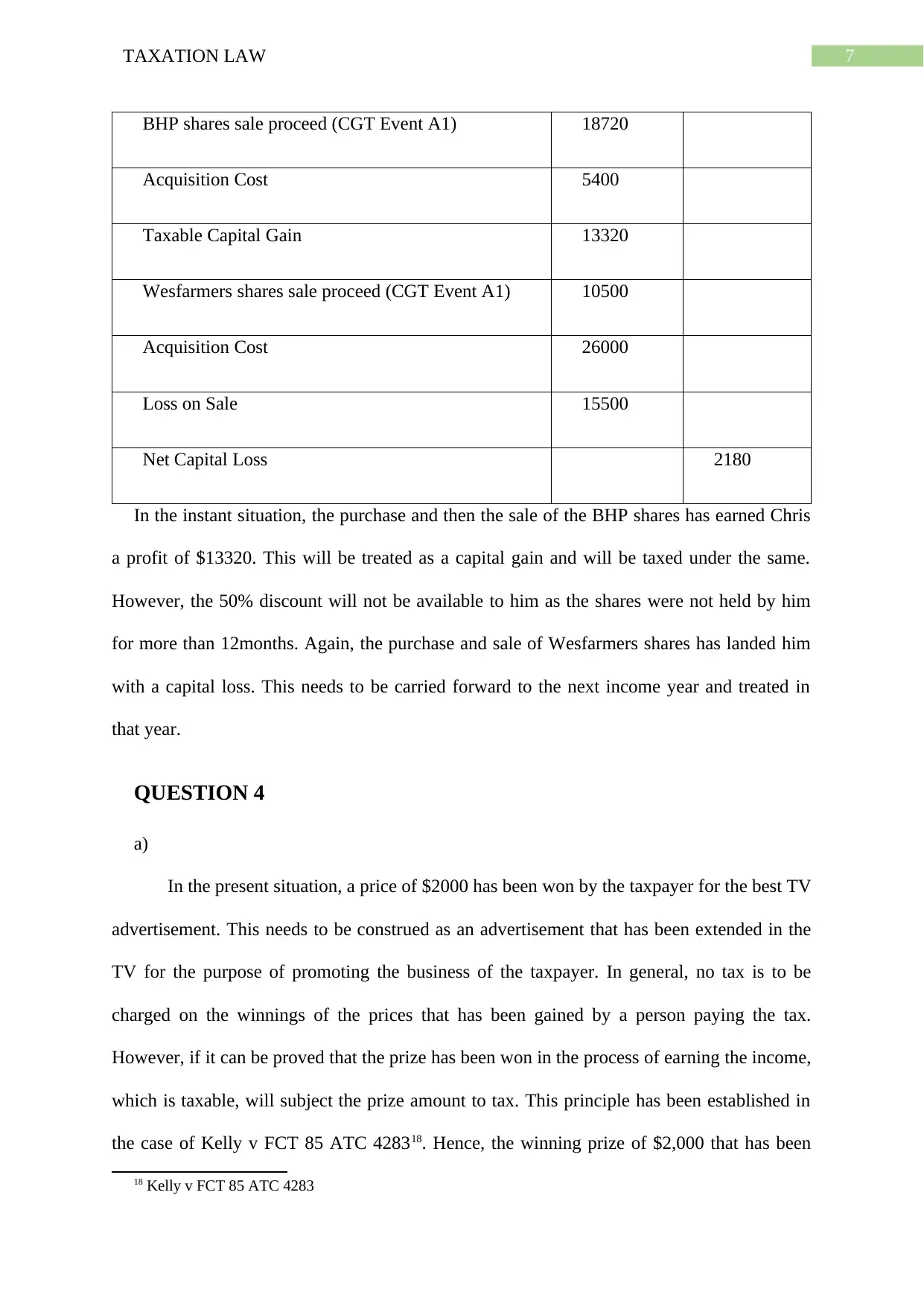
7TAXATION LAW
BHP shares sale proceed (CGT Event A1) 18720
Acquisition Cost 5400
Taxable Capital Gain 13320
Wesfarmers shares sale proceed (CGT Event A1) 10500
Acquisition Cost 26000
Loss on Sale 15500
Net Capital Loss 2180
In the instant situation, the purchase and then the sale of the BHP shares has earned Chris
a profit of $13320. This will be treated as a capital gain and will be taxed under the same.
However, the 50% discount will not be available to him as the shares were not held by him
for more than 12months. Again, the purchase and sale of Wesfarmers shares has landed him
with a capital loss. This needs to be carried forward to the next income year and treated in
that year.
QUESTION 4
a)
In the present situation, a price of $2000 has been won by the taxpayer for the best TV
advertisement. This needs to be construed as an advertisement that has been extended in the
TV for the purpose of promoting the business of the taxpayer. In general, no tax is to be
charged on the winnings of the prices that has been gained by a person paying the tax.
However, if it can be proved that the prize has been won in the process of earning the income,
which is taxable, will subject the prize amount to tax. This principle has been established in
the case of Kelly v FCT 85 ATC 428318. Hence, the winning prize of $2,000 that has been
18 Kelly v FCT 85 ATC 4283
BHP shares sale proceed (CGT Event A1) 18720
Acquisition Cost 5400
Taxable Capital Gain 13320
Wesfarmers shares sale proceed (CGT Event A1) 10500
Acquisition Cost 26000
Loss on Sale 15500
Net Capital Loss 2180
In the instant situation, the purchase and then the sale of the BHP shares has earned Chris
a profit of $13320. This will be treated as a capital gain and will be taxed under the same.
However, the 50% discount will not be available to him as the shares were not held by him
for more than 12months. Again, the purchase and sale of Wesfarmers shares has landed him
with a capital loss. This needs to be carried forward to the next income year and treated in
that year.
QUESTION 4
a)
In the present situation, a price of $2000 has been won by the taxpayer for the best TV
advertisement. This needs to be construed as an advertisement that has been extended in the
TV for the purpose of promoting the business of the taxpayer. In general, no tax is to be
charged on the winnings of the prices that has been gained by a person paying the tax.
However, if it can be proved that the prize has been won in the process of earning the income,
which is taxable, will subject the prize amount to tax. This principle has been established in
the case of Kelly v FCT 85 ATC 428318. Hence, the winning prize of $2,000 that has been
18 Kelly v FCT 85 ATC 4283
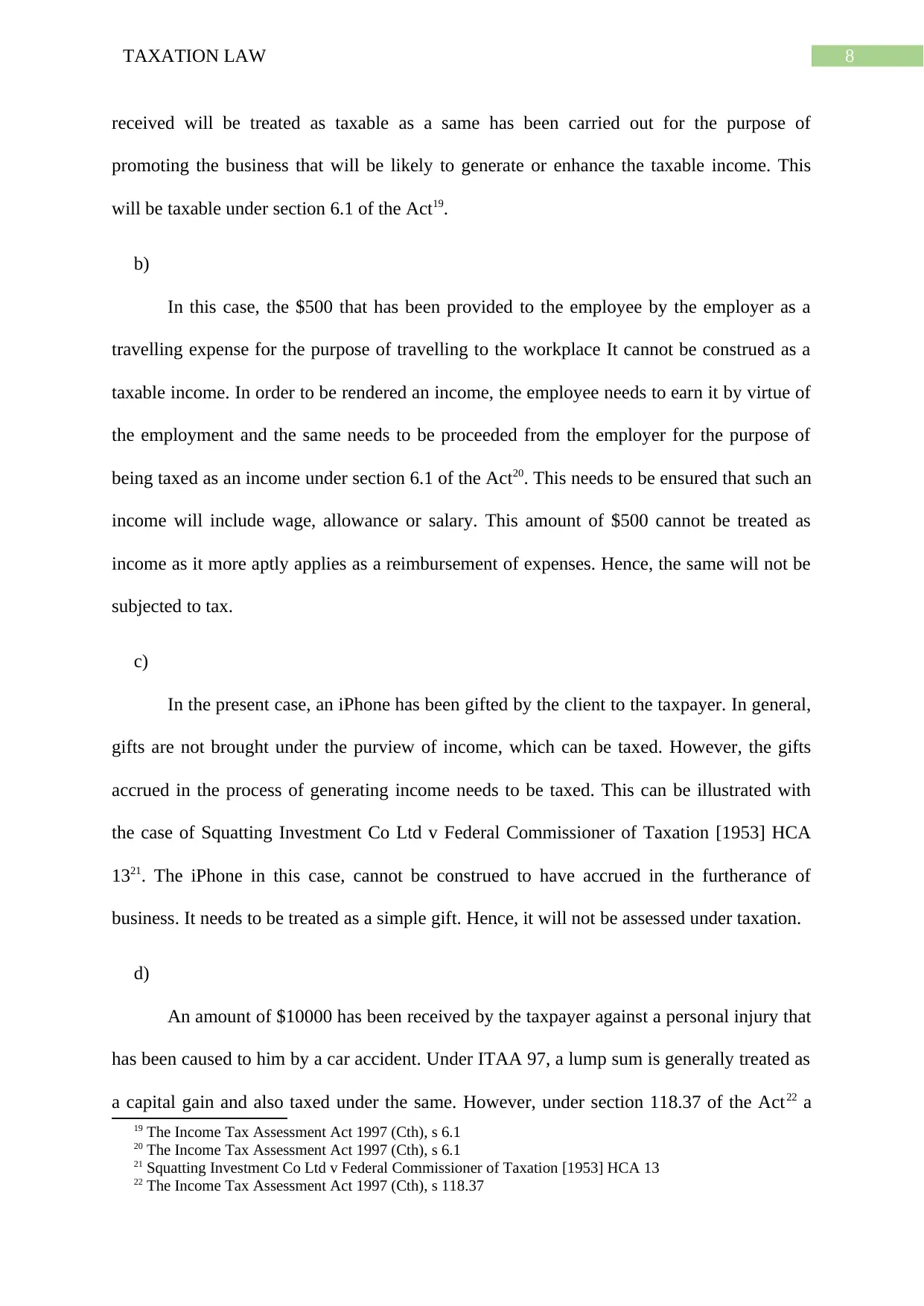
8TAXATION LAW
received will be treated as taxable as a same has been carried out for the purpose of
promoting the business that will be likely to generate or enhance the taxable income. This
will be taxable under section 6.1 of the Act19.
b)
In this case, the $500 that has been provided to the employee by the employer as a
travelling expense for the purpose of travelling to the workplace It cannot be construed as a
taxable income. In order to be rendered an income, the employee needs to earn it by virtue of
the employment and the same needs to be proceeded from the employer for the purpose of
being taxed as an income under section 6.1 of the Act20. This needs to be ensured that such an
income will include wage, allowance or salary. This amount of $500 cannot be treated as
income as it more aptly applies as a reimbursement of expenses. Hence, the same will not be
subjected to tax.
c)
In the present case, an iPhone has been gifted by the client to the taxpayer. In general,
gifts are not brought under the purview of income, which can be taxed. However, the gifts
accrued in the process of generating income needs to be taxed. This can be illustrated with
the case of Squatting Investment Co Ltd v Federal Commissioner of Taxation [1953] HCA
1321. The iPhone in this case, cannot be construed to have accrued in the furtherance of
business. It needs to be treated as a simple gift. Hence, it will not be assessed under taxation.
d)
An amount of $10000 has been received by the taxpayer against a personal injury that
has been caused to him by a car accident. Under ITAA 97, a lump sum is generally treated as
a capital gain and also taxed under the same. However, under section 118.37 of the Act22 a
19 The Income Tax Assessment Act 1997 (Cth), s 6.1
20 The Income Tax Assessment Act 1997 (Cth), s 6.1
21 Squatting Investment Co Ltd v Federal Commissioner of Taxation [1953] HCA 13
22 The Income Tax Assessment Act 1997 (Cth), s 118.37
received will be treated as taxable as a same has been carried out for the purpose of
promoting the business that will be likely to generate or enhance the taxable income. This
will be taxable under section 6.1 of the Act19.
b)
In this case, the $500 that has been provided to the employee by the employer as a
travelling expense for the purpose of travelling to the workplace It cannot be construed as a
taxable income. In order to be rendered an income, the employee needs to earn it by virtue of
the employment and the same needs to be proceeded from the employer for the purpose of
being taxed as an income under section 6.1 of the Act20. This needs to be ensured that such an
income will include wage, allowance or salary. This amount of $500 cannot be treated as
income as it more aptly applies as a reimbursement of expenses. Hence, the same will not be
subjected to tax.
c)
In the present case, an iPhone has been gifted by the client to the taxpayer. In general,
gifts are not brought under the purview of income, which can be taxed. However, the gifts
accrued in the process of generating income needs to be taxed. This can be illustrated with
the case of Squatting Investment Co Ltd v Federal Commissioner of Taxation [1953] HCA
1321. The iPhone in this case, cannot be construed to have accrued in the furtherance of
business. It needs to be treated as a simple gift. Hence, it will not be assessed under taxation.
d)
An amount of $10000 has been received by the taxpayer against a personal injury that
has been caused to him by a car accident. Under ITAA 97, a lump sum is generally treated as
a capital gain and also taxed under the same. However, under section 118.37 of the Act22 a
19 The Income Tax Assessment Act 1997 (Cth), s 6.1
20 The Income Tax Assessment Act 1997 (Cth), s 6.1
21 Squatting Investment Co Ltd v Federal Commissioner of Taxation [1953] HCA 13
22 The Income Tax Assessment Act 1997 (Cth), s 118.37
⊘ This is a preview!⊘
Do you want full access?
Subscribe today to unlock all pages.

Trusted by 1+ million students worldwide
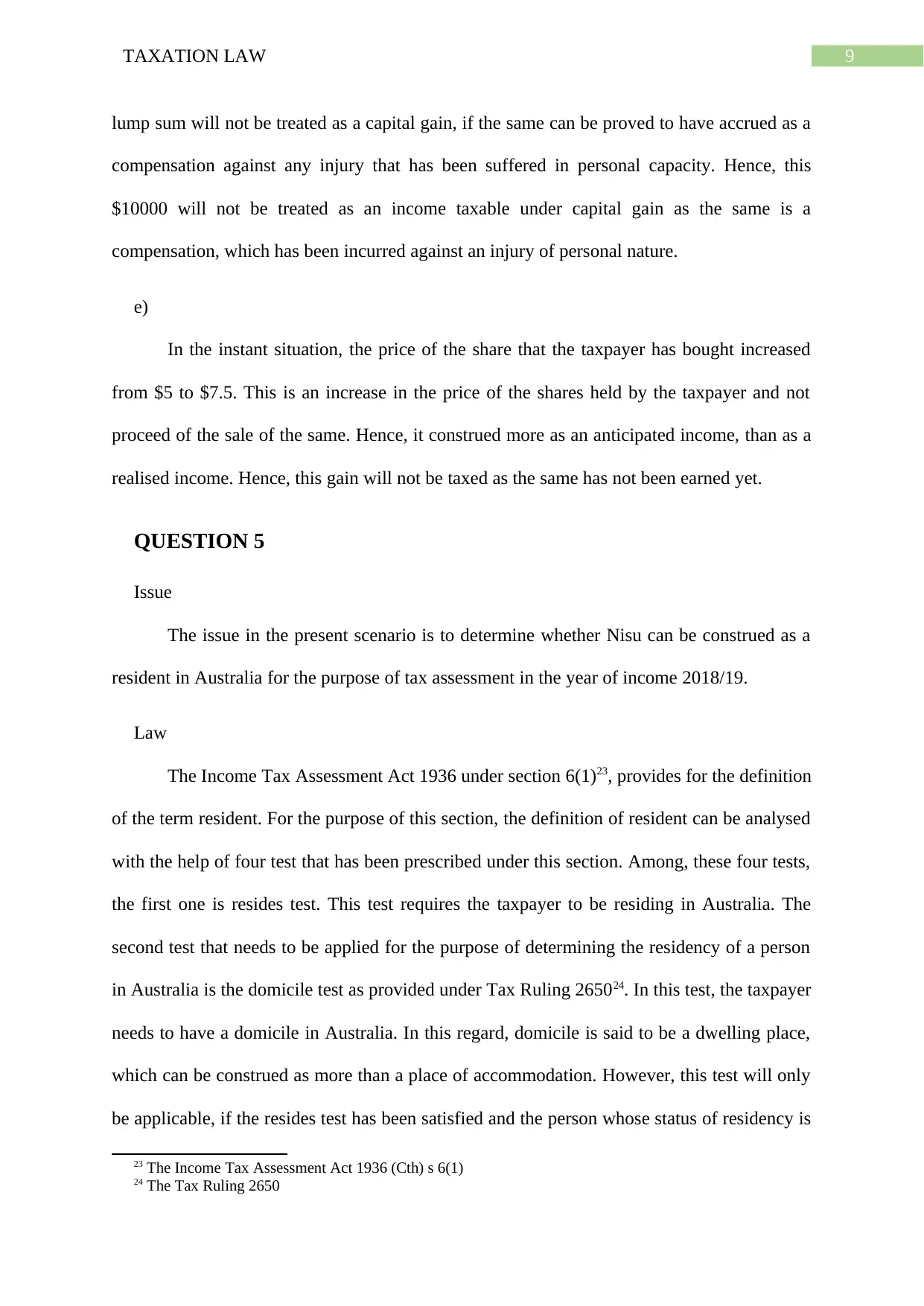
9TAXATION LAW
lump sum will not be treated as a capital gain, if the same can be proved to have accrued as a
compensation against any injury that has been suffered in personal capacity. Hence, this
$10000 will not be treated as an income taxable under capital gain as the same is a
compensation, which has been incurred against an injury of personal nature.
e)
In the instant situation, the price of the share that the taxpayer has bought increased
from $5 to $7.5. This is an increase in the price of the shares held by the taxpayer and not
proceed of the sale of the same. Hence, it construed more as an anticipated income, than as a
realised income. Hence, this gain will not be taxed as the same has not been earned yet.
QUESTION 5
Issue
The issue in the present scenario is to determine whether Nisu can be construed as a
resident in Australia for the purpose of tax assessment in the year of income 2018/19.
Law
The Income Tax Assessment Act 1936 under section 6(1)23, provides for the definition
of the term resident. For the purpose of this section, the definition of resident can be analysed
with the help of four test that has been prescribed under this section. Among, these four tests,
the first one is resides test. This test requires the taxpayer to be residing in Australia. The
second test that needs to be applied for the purpose of determining the residency of a person
in Australia is the domicile test as provided under Tax Ruling 265024. In this test, the taxpayer
needs to have a domicile in Australia. In this regard, domicile is said to be a dwelling place,
which can be construed as more than a place of accommodation. However, this test will only
be applicable, if the resides test has been satisfied and the person whose status of residency is
23 The Income Tax Assessment Act 1936 (Cth) s 6(1)
24 The Tax Ruling 2650
lump sum will not be treated as a capital gain, if the same can be proved to have accrued as a
compensation against any injury that has been suffered in personal capacity. Hence, this
$10000 will not be treated as an income taxable under capital gain as the same is a
compensation, which has been incurred against an injury of personal nature.
e)
In the instant situation, the price of the share that the taxpayer has bought increased
from $5 to $7.5. This is an increase in the price of the shares held by the taxpayer and not
proceed of the sale of the same. Hence, it construed more as an anticipated income, than as a
realised income. Hence, this gain will not be taxed as the same has not been earned yet.
QUESTION 5
Issue
The issue in the present scenario is to determine whether Nisu can be construed as a
resident in Australia for the purpose of tax assessment in the year of income 2018/19.
Law
The Income Tax Assessment Act 1936 under section 6(1)23, provides for the definition
of the term resident. For the purpose of this section, the definition of resident can be analysed
with the help of four test that has been prescribed under this section. Among, these four tests,
the first one is resides test. This test requires the taxpayer to be residing in Australia. The
second test that needs to be applied for the purpose of determining the residency of a person
in Australia is the domicile test as provided under Tax Ruling 265024. In this test, the taxpayer
needs to have a domicile in Australia. In this regard, domicile is said to be a dwelling place,
which can be construed as more than a place of accommodation. However, this test will only
be applicable, if the resides test has been satisfied and the person whose status of residency is
23 The Income Tax Assessment Act 1936 (Cth) s 6(1)
24 The Tax Ruling 2650
Paraphrase This Document
Need a fresh take? Get an instant paraphrase of this document with our AI Paraphraser
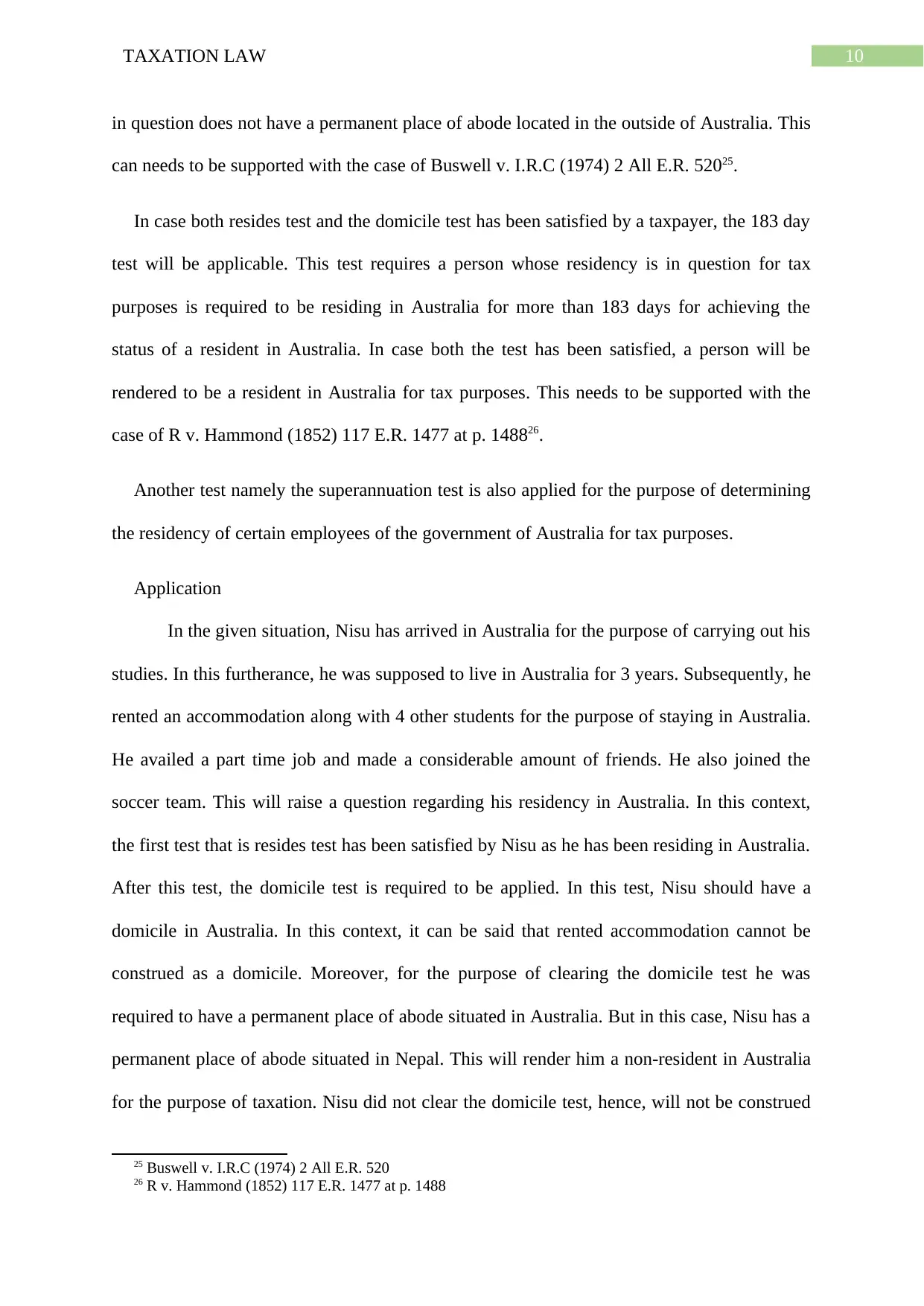
10TAXATION LAW
in question does not have a permanent place of abode located in the outside of Australia. This
can needs to be supported with the case of Buswell v. I.R.C (1974) 2 All E.R. 52025.
In case both resides test and the domicile test has been satisfied by a taxpayer, the 183 day
test will be applicable. This test requires a person whose residency is in question for tax
purposes is required to be residing in Australia for more than 183 days for achieving the
status of a resident in Australia. In case both the test has been satisfied, a person will be
rendered to be a resident in Australia for tax purposes. This needs to be supported with the
case of R v. Hammond (1852) 117 E.R. 1477 at p. 148826.
Another test namely the superannuation test is also applied for the purpose of determining
the residency of certain employees of the government of Australia for tax purposes.
Application
In the given situation, Nisu has arrived in Australia for the purpose of carrying out his
studies. In this furtherance, he was supposed to live in Australia for 3 years. Subsequently, he
rented an accommodation along with 4 other students for the purpose of staying in Australia.
He availed a part time job and made a considerable amount of friends. He also joined the
soccer team. This will raise a question regarding his residency in Australia. In this context,
the first test that is resides test has been satisfied by Nisu as he has been residing in Australia.
After this test, the domicile test is required to be applied. In this test, Nisu should have a
domicile in Australia. In this context, it can be said that rented accommodation cannot be
construed as a domicile. Moreover, for the purpose of clearing the domicile test he was
required to have a permanent place of abode situated in Australia. But in this case, Nisu has a
permanent place of abode situated in Nepal. This will render him a non-resident in Australia
for the purpose of taxation. Nisu did not clear the domicile test, hence, will not be construed
25 Buswell v. I.R.C (1974) 2 All E.R. 520
26 R v. Hammond (1852) 117 E.R. 1477 at p. 1488
in question does not have a permanent place of abode located in the outside of Australia. This
can needs to be supported with the case of Buswell v. I.R.C (1974) 2 All E.R. 52025.
In case both resides test and the domicile test has been satisfied by a taxpayer, the 183 day
test will be applicable. This test requires a person whose residency is in question for tax
purposes is required to be residing in Australia for more than 183 days for achieving the
status of a resident in Australia. In case both the test has been satisfied, a person will be
rendered to be a resident in Australia for tax purposes. This needs to be supported with the
case of R v. Hammond (1852) 117 E.R. 1477 at p. 148826.
Another test namely the superannuation test is also applied for the purpose of determining
the residency of certain employees of the government of Australia for tax purposes.
Application
In the given situation, Nisu has arrived in Australia for the purpose of carrying out his
studies. In this furtherance, he was supposed to live in Australia for 3 years. Subsequently, he
rented an accommodation along with 4 other students for the purpose of staying in Australia.
He availed a part time job and made a considerable amount of friends. He also joined the
soccer team. This will raise a question regarding his residency in Australia. In this context,
the first test that is resides test has been satisfied by Nisu as he has been residing in Australia.
After this test, the domicile test is required to be applied. In this test, Nisu should have a
domicile in Australia. In this context, it can be said that rented accommodation cannot be
construed as a domicile. Moreover, for the purpose of clearing the domicile test he was
required to have a permanent place of abode situated in Australia. But in this case, Nisu has a
permanent place of abode situated in Nepal. This will render him a non-resident in Australia
for the purpose of taxation. Nisu did not clear the domicile test, hence, will not be construed
25 Buswell v. I.R.C (1974) 2 All E.R. 520
26 R v. Hammond (1852) 117 E.R. 1477 at p. 1488
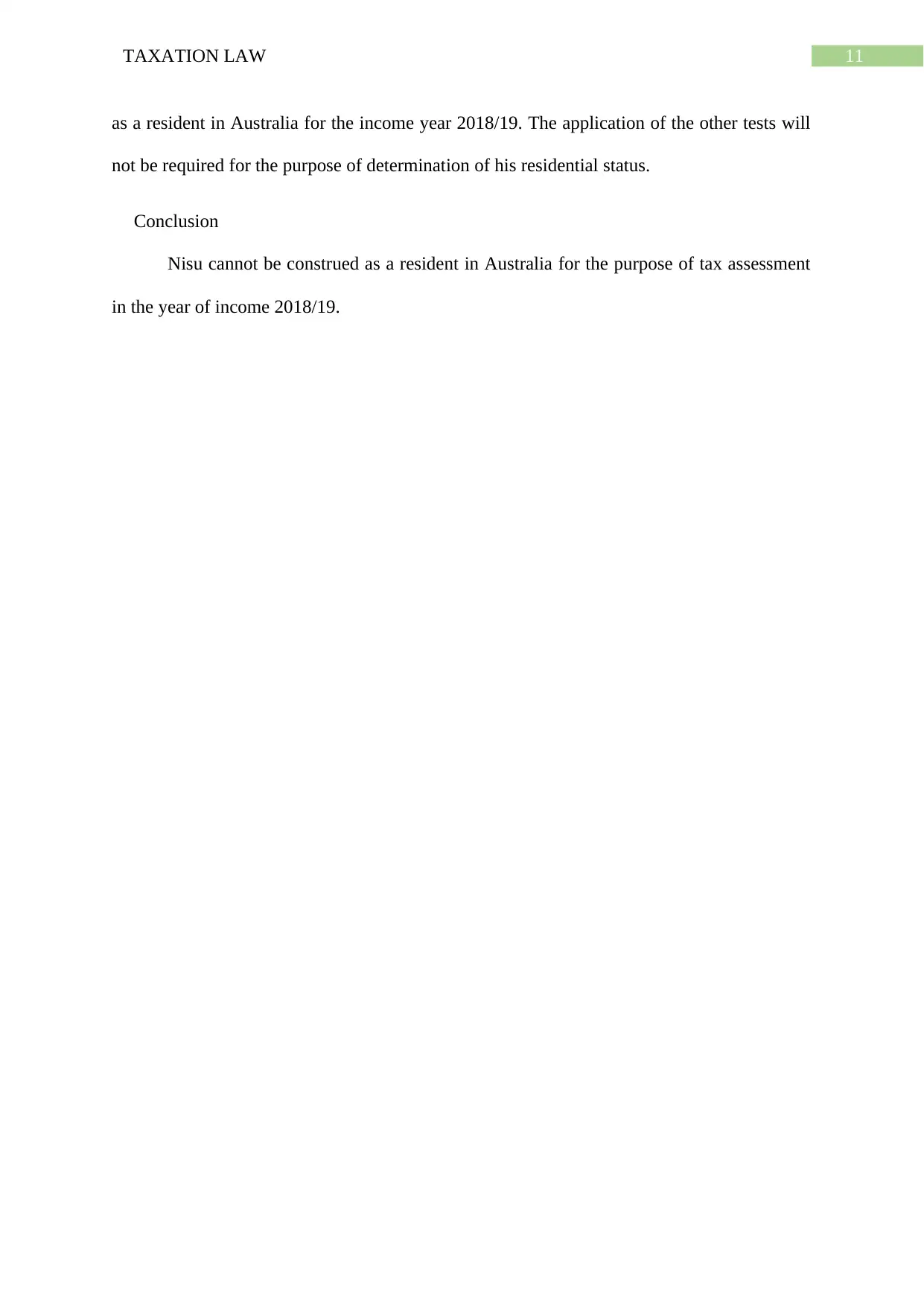
11TAXATION LAW
as a resident in Australia for the income year 2018/19. The application of the other tests will
not be required for the purpose of determination of his residential status.
Conclusion
Nisu cannot be construed as a resident in Australia for the purpose of tax assessment
in the year of income 2018/19.
as a resident in Australia for the income year 2018/19. The application of the other tests will
not be required for the purpose of determination of his residential status.
Conclusion
Nisu cannot be construed as a resident in Australia for the purpose of tax assessment
in the year of income 2018/19.
⊘ This is a preview!⊘
Do you want full access?
Subscribe today to unlock all pages.

Trusted by 1+ million students worldwide
1 out of 13
Related Documents
Your All-in-One AI-Powered Toolkit for Academic Success.
+13062052269
info@desklib.com
Available 24*7 on WhatsApp / Email
![[object Object]](/_next/static/media/star-bottom.7253800d.svg)
Unlock your academic potential
Copyright © 2020–2026 A2Z Services. All Rights Reserved. Developed and managed by ZUCOL.





